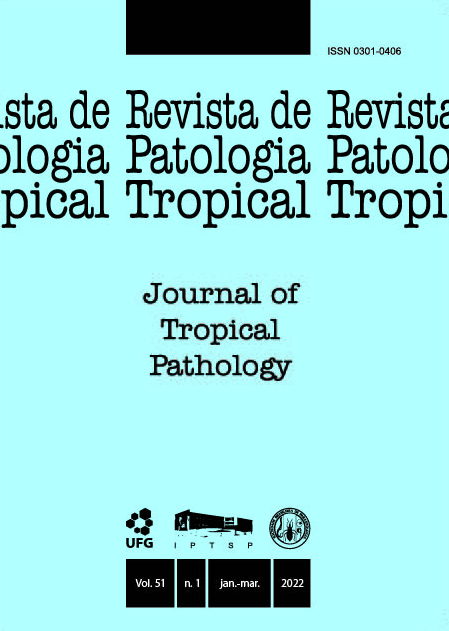Occurrence of potentially highly pathogenic free-living amoebae in ready made salads from restaurants in Jatai, Goias, Brazil
DOI:
https://doi.org/10.5216/rpt.v51i1.70704Resumo
Free-living amoebae (FLA) are part of a group of protozoa found worldwide and in the most diverse environments. They resist various temperatures and disinfection methods, and are a risk to human health. Pathogenic strains grow at high temperatures and under hyperosmolarity conditions. Some FLA genera are mainly related to primary amoebic meningoencephalitis (PAM), skin ulcerations, corneal lesions, kidney and lung infections and keratitis. Therefore, studies that assess the pathogenic potential of FLA are public health issues of great concern. We aimed to evaluate the pathogenic potential of FLA isolated in salads from restaurants in vitro, using osmotolerance and thermotolerance tests. Forty-five isolates were used from ready-made salads purchased in restaurants in Jatai, Goias. Twelve isolates subjected to the osmotolerance test (26.6%) showed growth in 0.5 M mannitol, 18 (40.0%) in 1.0 M mannitol and 16 (35.5%) in 1.5 M mannitol, 13 (28.8%) isolates did not show growth. Four isolates that underwent the thermotolerance test (8.9%) showed growth at 25°C, 8 (17.8%) showed growth at 30°C, 3 (6.7%) showed growth at 37°C and 30 (66.7%) did not show growth. With the indices obtained in the present study, we concluded that 15.6% of the isolates were osmotolerant and thermotolerant. Our findings highlight a public health problem once these FLA are associated with harboring or being harbored by microorganisms responsible for diseases such as diarrhea and meningitis. Measures are required to improve food hygiene and so avoid FLA-related health problems.
KEY WORDS: Pathogenicity; osmotolerance test; thermotolerance test; food contamination; free-living amoebae.
Downloads
Downloads
Publicado
Como Citar
Edição
Seção
Licença
The manuscript submission must be accompanied by a letter signed by all authors stating their full name and email address, confirming that the manuscript or part of it has not been published or is under consideration for publication elsewhere, and agreeing to transfer copyright in all media and formats for Journal of Tropical Pathology.

